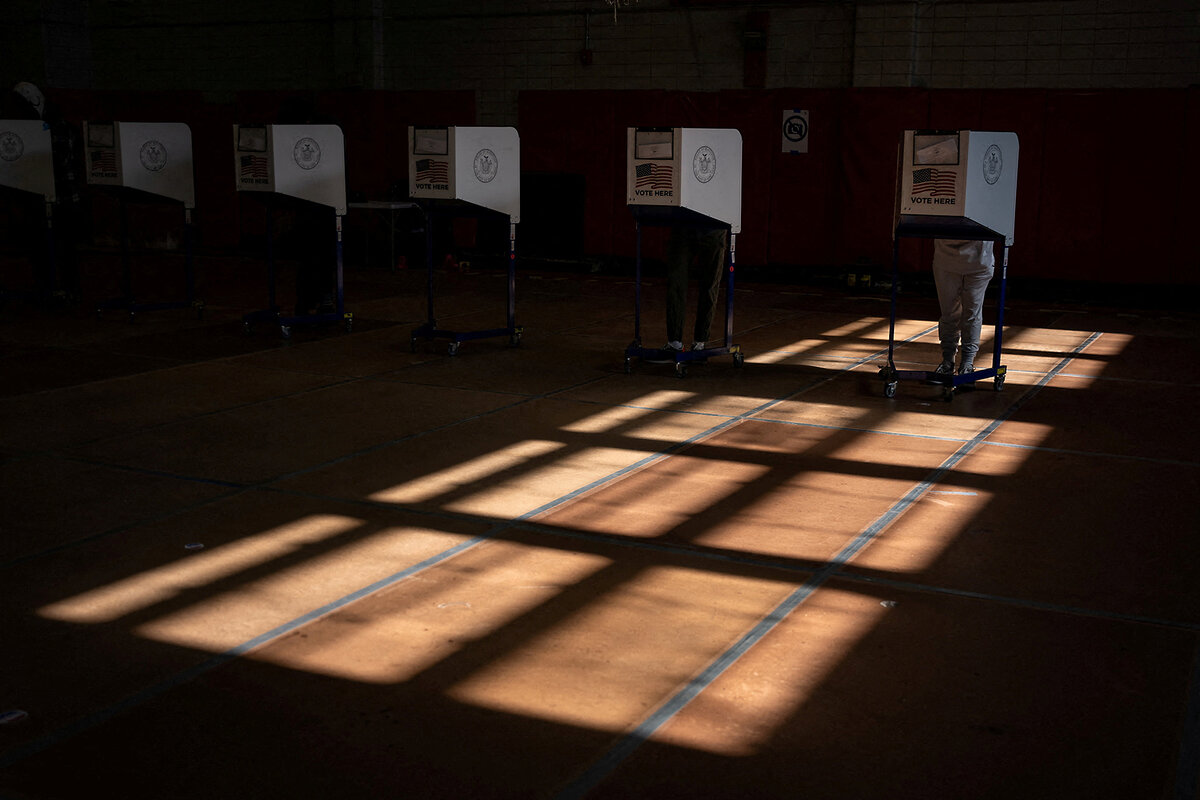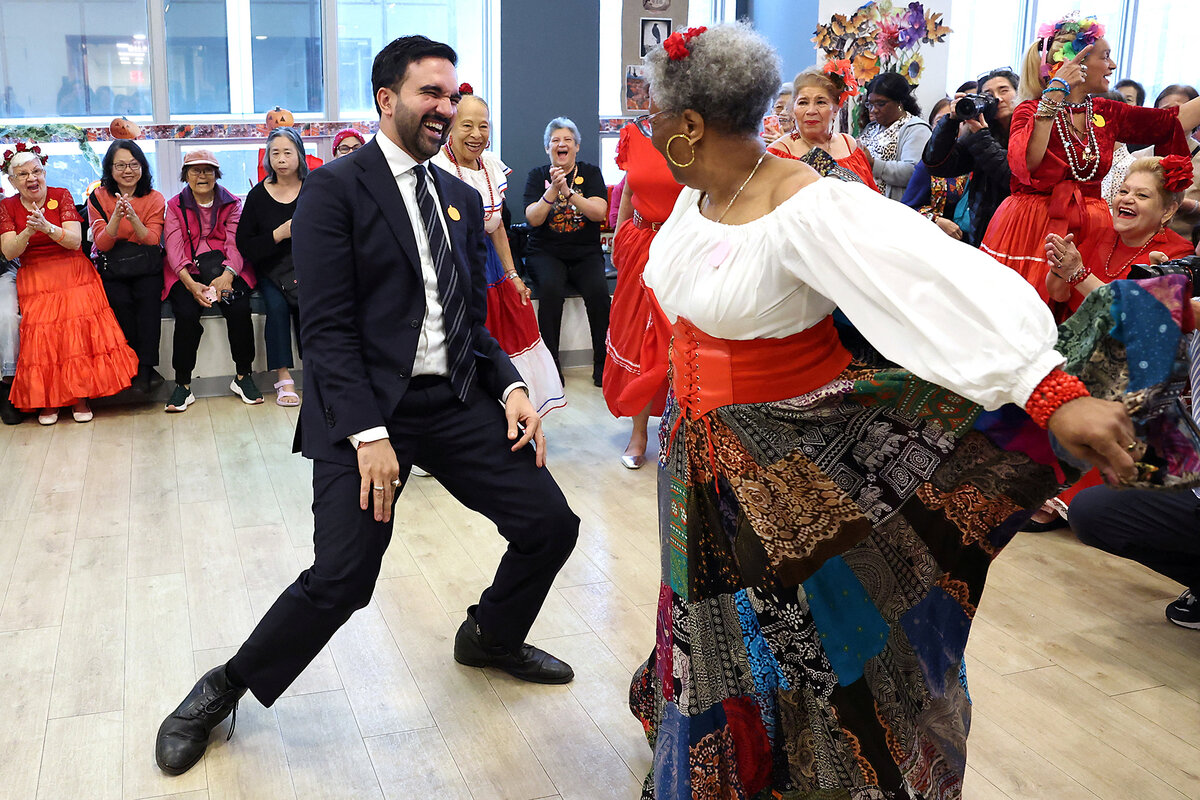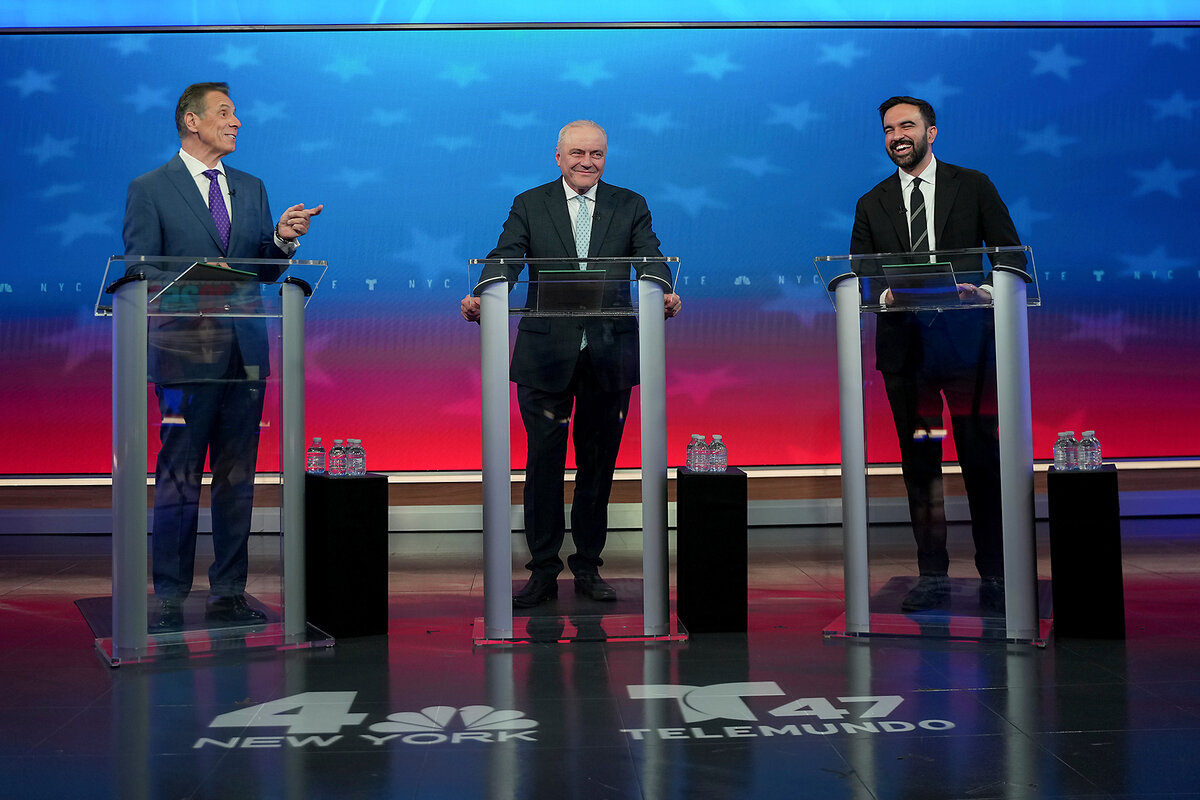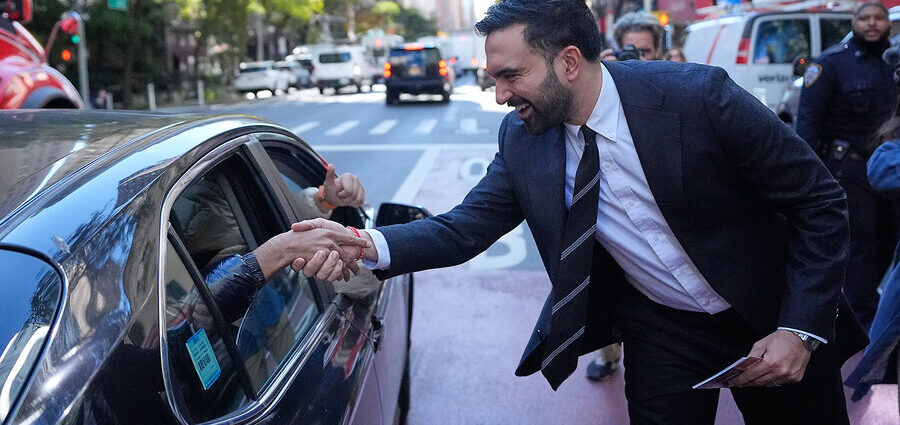“What’s going on here?” asks a New Yorker named Joey, surveying the crowd and cameras stuffed inside McCaffrey Playground in the Hell’s Kitchen neighborhood on Manhattan’s West Side. Taking in the people climbing children’s play equipment for a better look, he guesses there must be a famous actor doing a movie shoot. This is New York City, after all.
At the center of the scrum on this late October evening, however, is no Hollywood celebrity but New York Assemblyman Zohran Mamdani, the once unknown thirty-something who now stands on the precipice of becoming mayor of the largest city in the United States. When Joey learns this, he ducks inside the playground to join the crowd. He had actually been on his way to cast an early vote for Mr. Mamdani. But that can wait. The man of the moment is here.
Mr. Mamdani, who exploded onto the national political scene after besting incumbent Mayor Eric Adams and former New York Gov. Andrew Cuomo in the city’s June Democratic primary, is widely expected to win the general election on Tuesday. Most polls have him leading Mr. Cuomo, who is now running as an independent, and Republican nominee Curtis Sliwa by double digits. (Mr. Adams, who was also running as an independent, dropped out of the race in September.) A three-term state legislator who identifies as a democratic socialist, Mr. Mamdani has electrified young people and left-leaning voters with an affordability-centered campaign that promises to freeze rents for rent-stabilized apartments, make city buses free, and provide free childcare for all New York City children between the ages of 6 weeks and 5 years. He says he would pay for these programs by raising taxes on corporations and the wealthy.
Why We Wrote This
Zohran Mamdani, who heads into Election Day with a commanding lead, could be the first New York mayor in more than half a century who didn’t win an outright majority. And New York is a place where it’s difficult to implement big changes.
In Mr. Mamdani, supporters see a skilled and authentic political talent whose winning messages and viral, online content are showing Democrats how to win young and disaffected voters heading into the 2026 midterm elections. Opponents, both Democratic and Republican, say a Mayor Mamdani will be a high-profile political liability in a country largely made up of center-right voters, where socialism is viewed favorably by fewer than 40%.
“They’re making Mamdani a mainstream Democrat now,” Republican U.S. House Speaker Mike Johnson said in a press conference on Thursday, adding that every Democrat running for Congress next year should be asked about Mr. Mamdani and his positions. “Mamdani is a gift for [President Donald Trump],” echoed Mr. Cuomo on ABC’s The View. “Going into the midterms, he will take a picture of Mamdani and run around the country and say ‘Here is what happened to the Democrats. They are now communists.’” (Mr. Mamdani has had to clarify in interviews that he is not a communist, despite GOP claims.)

Angelina Katsanis/Reuters
Voters cast ballots at a polling station on the first day of early voting for New York’s mayoral election in Brooklyn, New York, Oct. 25, 2025.
It’s not hyperbole to say that, if he is elected mayor on Tuesday, the fate of the entire party could to some extent rest on Mr. Mamdani’s shoulders – and whether he succeeds or fails.
Underscoring the stakes, many Democratic Party leaders have been walking a delicate balancing act, praising Mr. Mamdani while also keeping him at arm’s length. Senate Minority Leader Chuck Schumer of New York has not endorsed him – instead telling reporters, when pressed, that they are “continuing to talk.” And after skirting the same endorsement question for weeks, House Minority Leader Hakeem Jeffries, also of New York, said on the eve of the first day of early voting that he would support Mr. Mamdani along with “the entire citywide Democratic ticket.”
Former President Barack Obama, who also has not publicly endorsed Mr. Mamdani, called the mayoral candidate over the weekend, according to the New York Times, to say his campaign has been “impressive to watch,” and offered to be a “sounding board” in the future. On the same weekend as the call, which Mr Obama’s team declined to comment on, the former president campaigned with Democratic gubernatorial nominees in Virginia and New Jersey.
“Everyone who cares about government and politics will be watching everything [Mamdani] does,” says Jack O’Donnell, a New York Democratic strategist. “Man, it’s going to be a tough job.”
Even enacting his agenda could be a major challenge. Despite his commanding lead, Mr. Mamdani could be the first New York mayor in more than half a century to win with less than 50% of the vote, which could undercut any claim to a mandate. And despite being a strongly Democratic city, New York has unique structural challenges that make it difficult to implement big changes – as the city’s last progressive mayor, Bill de Blasio, learned.
When Mr. de Blasio first ran for office, he was seen, like Mr. Mamdani, as a radical idealist and a break from politics-as-usual, says Joseph Viteritti, a public policy professor at Hunter College and author of a book about Mr. de Blasio. The book’s title, “The Pragmatist: Bill de Blasio’s Quest to Save the Soul of New York,” is a nod to how that turned out. “[Mr. de Blasio] was forced to become a pragmatist – to figure out what he could do under the circumstances.”
A pendulum swing
New York City mayors are both local and national figures, shaped by – and in reaction to – local and national political forces. Mr. de Blasio’s 2013 mayoral campaign focused, like Mr. Mamdani’s, on the city’s rising inequality. He ran on promises to implement universal prekindergarden, end the police department’s controversial stop-and-frisk program, and impose higher taxes on New Yorkers earning more than $500,000.
The former city councilman and public advocate also promised to be a sharp departure from two decades of Republican leadership under Mayors Rudy Giuliani and Michael Bloomberg. A similar pendulum swing followed Mr. de Blasio’s own tenure. The progressive mayor, who left office with dismal approval ratings, was succeeded by Eric Adams, a moderate Black Democrat and former police officer who campaigned on the issue of crime.
Mr. Adams’ election came during the COVID-19 crime spike, when Americans across the country became more concerned with public safety, and Democratic officials began distancing themselves from the “defund the police” message some had adopted in the wake of George Floyd’s murder and the Black Lives Matter protests. Mr. Mamdani, who once called for defunding the police, has apologized to the NYPD for past comments calling the force “racist, anti-queer” and “a major threat” to safety.

Democratic nominee Zohran Mamdani dances while campaigning at a senior center in Manhattan’s Lower East Side in New York, Oct. 31, 2025.
During this year’s Democratic primary in New York it was a different national issue – the war in Gaza – that energized many voters, particularly younger ones who have been frustrated with Democratic leaders’ support for Israel.
Mr. Mamdani, a practicing Muslim and longtime advocate for the Palestinian people, has called the war in Gaza a genocide and pledged to arrest Israeli Prime Minister Benjamin Netanyahu if he comes to New York. His primary victory was propelled by voters under age 30 who had the biggest turnout of any age group, doubling their numbers from four years earlier. (Since the primary, Mr. Mamdani has said he would “discourage” use of the term “globalize the intifada,” which many view as a call to violence against Jewish people.)
“The national climate is fueling Zohran right now,” says Derek Kitchen, a former member of the Utah Senate and a Biden administration appointee who came to McCaffrey Playground last week to see Mr. Mamdani.
Mr. Kitchen believes Mr. Mamdani could succeed where Mr. de Blasio did not, given the current economic climate, with the high cost of living and AI threatening to wipe out many jobs. “There’s a larger reckoning around structural change – so it’s a different mandate for Zohran,” he says. “We are in a moment that the whole country, the whole world, is shifting dramatically. … People like Zohran are catching that moment. De Blasio never had a chance.”
Others, however, predict a brewing conflict between a potential Mamdani and Trump administrations that could stymie the young New York mayor.
“If you go back to previous mayors who identified as progressive, each one was able to launch progressive policies because they were getting support from progressive presidents in Washington,” says Mr. Viteritti. Mayor Fiorello La Guardia, who had previously served in Congress as a socialist, had a good relationship with President Franklin Roosevelt and got large sums of New Deal money for projects like LaGuardia Airport. In the late 1960s, Mayor John Lindsay was appointed by President Lyndon Johnson to help lead a national commission on civil rights and urban unrest.
“De Blasio didn’t have that. He had Trump in Washington,” says Mr. Viteritti. Now, “[Mr. Mamdani] is facing a worse situation with Trump 2.0 in the White House – because not only is he not supportive, he is hostile to him personally and his agenda.”
The Albany factor
It’s not just Washington. New York mayors also face an often-complicated relationship with the governor and state legislators in Albany. Mr. de Blasio had planned to pay for universal prekindergarten by imposing a 1% tax on New Yorkers making over $500,000. Upon taking office, he and his team plunged ahead, hiring new teachers, opening new classrooms, and offering enrollment to tens of thousands of students. Mr. Mamdani has cited this accomplishment in calling Mr. de Blasio the best mayor of his lifetime.

Independent candidate and former New York Gov. Andrew Cuomo (left), GOP nominee Curtis Sliwa (center), and Democratic nominee Zohran Mamdani participate in a debate, Oct. 16, 2025, in New York.
But New York’s mayor doesn’t have the power to raise taxes or impose new ones without the approval of the state lawmakers and governor. And then-Governor Cuomo blocked Mr. de Blasio’s proposed tax increase.
“The city is a creature of the state,” says Sidney Davidoff, who was an assistant to former Mayor Lindsay and a friend of Mr. de Blasio’s. He cites an old saying that New York’s mayor can’t flush the toilets without the governor’s permission. “The key is to pick your fights and see which ones you really can win.”
Mr. Cuomo eventually found other state funds for the mayor’s prekindergarten program. But Mr. de Blasio continued to push for his tax hike. He cited his election margins – he won the crowded Democratic primary with 40% of the vote and the general election with almost 75% – as a clear “mandate” for the tax.
Still, Albany never allowed Mr. de Blasio to fulfill his tax hike promise. Which could hold a lesson for Mr. Mamdani, who has proposed a 2% tax on New Yorkers making over $1 million. New York Democratic Gov. Kathy Hochul, who waited until September to endorse Mr. Mamdani, has called tax increases a “non-starter.”
“If de Blasio had spent more time celebrating [prekindergarten] rather than trying to push the ideological side of the wealth tax, he would have had a more successful mayoralty,” says Mr. O’Donnell, the Democratic strategist.
Since winning the Democratic primary, Mr. Mamdani has made efforts to reassure mainstream Democrats, meeting with business executives and other powerful interests, and has suggested flexibility on some of his positions. He told the New York Times Daily podcast that he would be open to other funding mechanisms for his proposals (which, by some estimates could cost nearly $7 billion), saying that “far more important than the means by which you fund something is the fact that you are in fact funding it.” In his last debate, Mr. Mamdani said he would ask New York Police Commissioner Jessica Tisch, who has expressed different views on criminal justice, to stay on.
At McCaffrey Playground in Hell’s Kitchen, Mr. Mamdani addresses the 100 or so volunteers who have assembled in the park before canvassing potential voters. Then, he turns to the press to offer a sweeping vision of change, with some big-tent touches. He praises former Mayor Bloomberg’s expansion of park access. He quotes Mr. La Guardia, saying you cannot preach liberty to people in a starving land. He reiterates his well-known proposals on buses, child care, rents, a corporate tax rate to match New Jersey’s – and throws in another promise, to demonstrate that the value of democracy is “not just as an ideal” but “in its ability to deliver on the material needs of working people.”
The job, if he gets it, starts Jan. 1.

